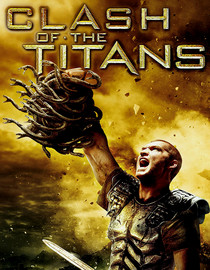4.03.2010
REVIEW: Clash of the Titans (Louis Letterier, 2010)
When mankind defies Zeus (Liam Neeson), its blasphemy fuels the ruler of the underworld, Hades (Ralph Fiennes), thus spurring a three-sided conflict threatening the destruction of Argos. The vengeful Perseus (Sam Worthington), a demigod freshly rescued from a skirmish that killed his foster parents, is sent with a band of ornery soldiers on a quest for Argos' salvation. Wait, this doesn't sound like a remake of Ray Harryhausen's 1981 classic... but it is.
As much as I enjoy it, I'll be the first to admit the original "Clash of the Titans" doesn't have much titan clashing per se, so the addition of Hades as a wronged deity out to conquer Mount Olympus sounded promising. Aspects of the source material scrapped in Hades' favor aren't likely to translate well to modern audiences anyhow. For example, I'm not sure how today's moviegoers would react to Sam Worthington turning himself invisible, sneaking into the princess' chambers and watching her sleep. It makes sense to switch the focus from these events to more potentially clash-worthy ones. The problem is that Hades' mutinous story - plot points of which are prone to come out of thin air - overpowers the new film, rendering the shards of what was into utterly useless footnotes.
The central characters as many know them are the noble Perseus on a journey of self-discovery, the innocent Andromeda on a quest for love and the compellingly tragic yet terrifying Calibos. In this retelling, the invasive alterations render the latter two mere shadows of their former selves - obligatory references to the "Titans" legacy. Andromeda's story fails to so much as obey logic while Calibos, looking more like John Hurt's Elephant Man than a cursed swamp horror, gets an origin makeover then proceeds to take up precious space. Even our key protagonist, Perseus, would be frivolous were it not for his conveniently divine heritage. This may be the greatest example yet of the remake trend's maddening incumbency in that enough originality is present to warrant an entirely new film, but the marketing tool of name recognition demands it be called "Clash of the Titans."
So the main characters are given the footnote treatment, but at least this restructuring is trimming some fat, right? Early on there's even an admittedly humorous cast-off for Bubo, the original's much-maligned mechanical owl, leading one to believe that is indeed the case. As quickly as Bubo's proverbial fat gets the trim, however, we are bombarded by an overpopulation of side characters to take his place. Most of these blatantly unoriginal and occasionally annoying characters provide nothing more than something new to look at and there are so very many that each gets but a scant few moments of screentime. In fact, the only new character with a finite purpose seems to be there solely so she can provide exposition to the already exposition-heavy proceedings. Too bad that for all her talking she barely manages to skim the surface of actually important backstory before falling victim to one of the more contrived romance subplots in recent memory.
In the questionable character barrage's midst are, of course, plenty of battle scenes to satisfy our appetite for destruction. It is within these scenes the film's lesser qualities are most evidenced. All-too-familiar quick and close shots dominate our heroes' physical trials, making it near impossible to discern the goings-on until each encounter concludes. As if claustrophobic combat wasn't enough, we're also subjected to an abuse of unnecessary "bullet time." This is not to say the battles are without beastly merit. After all, what would a remake of a Ray Harryhausen film be without some great creatures to drool over? Thankfully, the fearsome recreations of "Uncle Ray's" giant scorpion horde and the gargantuan Kraken himself stand to recapture testosterone-charged imaginations. Even so, the scope of impressive effects seems limited to these examples. The remainder is embarrassingly second-rate. Furthermore, the monsters' digital trappings inevitably fail to accomplish an endearing nature and they are soon forgotten. It's just not the same when you know it was all created on a computer screen.
As for our fleshy participants, the only notable performance comes from ever-reliable Liam Neeson, updating Laurence Olivier's Zeus. When it comes to the question of "who did it best," I'll still lean toward Niall MacGinnis from perhaps Harryhausen's finest film, "Jason and the Argonauts," but, to be fair, Neeson's acting was not allowed breathing room by the haphazard pacing of this new "Clash." Embodying a raspy Hades with a receding hairline is an uncharacteristically neutered Ralph Fiennes. When not zooming about in the form of a harpy mob (a possible homage to the aforementioned "Argonauts"), he's busy squandering opportunities to become a memorable villain. Finally, vying for the "least dimensional turn of the early decade" trophy is Sam Worthington. His inexplicably buzz-cut Perseus draws strength from brutish stubbornness portrayed through a series of scowls and little more. Worthington has submitted solid supporting performances in films like "Rogue," but is he really the blockbuster-carrying star James Cameron wants him to be?
Though director Louis Letterier claims adoration of the source material, his limp "Clash of the Titans" disrespects that source, posing no threat to its legacy. The painfully conventional update plays as a desperate made-for-television movie with misplaced actors of repute and slightly better effects. Drastic amendments to the story may be well-intentioned but ultimately cause the greatest detriment. Even the few positive changes drown in mired surroundings. This "Clash" shares more in common with Disney's "Hercules" than Harryhausen's classic. Children may enjoy it, thinking they're experiencing a big, grown-up movie while their parents yearn for Bubo.


